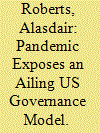| Srl | Item |
| 1 |
ID:
174850


|
|
|
|
|
| Summary/Abstract |
The COVID-19 pandemic has taken a devastating toll on the lives of older adults, intensifying long-standing challenges in the US health care system. Persistent health and mortality disparities on the basis of race and socioeconomic status, staffing shortages and insufficient financial resources at some nursing homes, and a reluctance among Americans to make formal plans for their end-of-life health care are problems of heightened magnitude in the pandemic era. Policy solutions like extending Medicare benefits to younger people, increasing Medicaid reimbursement rates, and facilitating formal conversations regarding end-of-life care may help Americans to age and die with dignity.
|
|
|
|
|
|
|
|
|
|
|
|
|
|
|
|
| 2 |
ID:
174849


|
|
|
|
|
| Summary/Abstract |
By transforming patterns of travel and work around the world, the COVID-19 pandemic is accelerating the transition to renewable energy and the decline of fossil fuels. Lockdowns brought car commuting and plane travel to a near halt, and the mass experiment in which white-collar employees have been working from home may permanently reduce energy consumption for business travel. Renewable energy and electric vehicles were already gaining market share before the pandemic. Under pressure from investors, major energy companies have started writing off fossil fuel reserves as stranded assets that are no longer worth the cost of extracting. These shifts may indicate that “peak oil demand” has arrived earlier than expected.
|
|
|
|
|
|
|
|
|
|
|
|
|
|
|
|
| 3 |
ID:
174848


|
|
|
|
|
| Summary/Abstract |
Since the 1990s and Bill Clinton’s embrace of key parts of Ronald Reagan’s legacy, mainstream US governance has been guided by a bipartisan consensus around a formula of shrinking the federal government’s responsibilities and deregulating the economy. Hailed as the ultimate solution to the age-old problem of governing well, the formula was exported to the developing world as the Washington Consensus. Yet growing political polarization weakened the consensus, and in a series of three major crises over the past two decades—9/11, the global financial crisis, and the COVID-19 pandemic—US policymakers opted for pragmatism rather than adherence to the old formula, which appears increasingly inadequate to cope with current governance challenges.
|
|
|
|
|
|
|
|
|
|
|
|
|
|
|
|
| 4 |
ID:
174845


|
|
|
|
|
| Summary/Abstract |
Forced migrants and refugees are affected by the COVID-19 pandemic in different and often more profound ways than local populations. This article examines the multilayered vulnerabilities these groups face due to forced immobility, precarious legal status, loss of income, and risks of eviction due to lockdown measures, as well as forced return migration. It discusses the public health and socioeconomic implications of each of these contexts, providing examples from different world regions, with a focus on South America. A key conclusion is the importance of providing regularization mechanisms for migrants, as well as including migrant and refugee populations in states’ emergency responses.
|
|
|
|
|
|
|
|
|
|
|
|
|
|
|
|
| 5 |
ID:
174844


|
|
|
|
|
| Summary/Abstract |
Many developing countries have large populations at risk of falling into chronic poverty due to threats to their health and livelihoods. Despite global poverty reduction over recent decades, many remain near-poor, and an episode of ill health or job loss can plunge a household into poverty. The coronavirus pandemic threatens to send tens of millions of people around the world below the poverty line. Some countries are especially unprepared to protect their people from health and economic shocks. They should focus on reforms to improve access to health care, secure work, and opportunities for social mobility.
|
|
|
|
|
|
|
|
|
|
|
|
|
|
|
|
| 6 |
ID:
174846


|
|
|
|
|
| Summary/Abstract |
Comparing the virus responses in Germany, the United Kingdom, and the United States shows that in order for scientific expertise to result in effective policy, rational political leadership is required. Each of these three countries is known for advanced biomedical research, yet their experiences in the COVID-19 pandemic diverged widely. Germany’s political leadership carefully followed scientific advice and organized public–private partnerships to scale up testing, resulting in relatively low infection levels. The UK and US political responses were far more erratic and less informed by scientific advice—and proved much less effective.
|
|
|
|
|
|
|
|
|
|
|
|
|
|
|
|